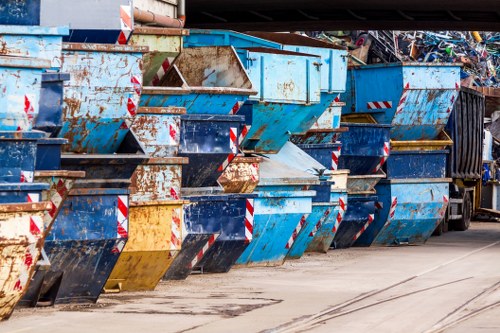Recycling and Rubbish New Addington

Introduction to Recycling in New Addington
Recycling plays a crucial role in maintaining the cleanliness and sustainability of New Addington. With increasing waste production, it's essential for residents to adopt effective recycling habits to reduce their environmental footprint.
New Addington offers various recycling facilities and services to help manage household waste efficiently. Understanding these services can make a significant difference in how waste is handled in the community.
By participating in local recycling programs, residents contribute to a healthier environment and support the community's efforts to manage rubbish responsibly.

Recycling Services Available
Household Recycling
Household recycling in New Addington includes the collection of paper, glass, plastics, and metals. Residents are encouraged to sort their waste into designated bins provided by the local council.
Commercial Recycling
Businesses in New Addington have access to commercial recycling services that handle larger volumes of waste. These services ensure that offices and commercial establishments manage their rubbish sustainably.
Electronic Waste Recycling
Electronic waste recycling is available for disposing of old electronics safely. This prevents harmful substances from entering the environment and allows valuable materials to be reused.

Recycling Tips for Residents
Reduce, Reuse, Recycle
Adopting the three Rs can significantly minimize waste. Reducing consumption, reusing items when possible, and recycling materials are effective ways to manage rubbish.
Proper Sorting
Properly sorting recyclables from non-recyclables ensures that materials are processed correctly. Familiarize yourself with the local recycling guidelines to avoid contamination.
Composting
Composting organic waste like food scraps and garden waste can reduce the amount of rubbish sent to landfills and create nutrient-rich soil for gardening.

Challenges in Recycling
Contamination of Recyclables
One of the main challenges is the contamination of recyclables. Improper sorting can lead to entire batches of recyclables being discarded, reducing the effectiveness of recycling programs.
Limited Awareness
Limited awareness about recycling practices and the importance of waste management can hinder community participation. Education and outreach programs are essential to address this issue.
Infrastructure Limitations
Insufficient recycling infrastructure can limit the capacity to process recyclables efficiently. Investing in better facilities and technologies can enhance recycling efforts.

Future of Recycling in New Addington
Community Initiatives
Community-led initiatives, such as recycling drives and educational workshops, can boost participation and awareness. These initiatives foster a sense of responsibility among residents.
Technological Advancements
Advancements in recycling technology can improve the efficiency and effectiveness of waste processing. Automated sorting systems and better recycling methods are on the horizon.
Sustainable Practices
Emphasizing sustainable practices in daily life can lead to long-term benefits for the environment. Encouraging the use of reusable products and reducing single-use items are key strategies.
Nearby Areas and Their Recycling Efforts
New Addington is surrounded by several areas that actively participate in recycling and rubbish management. Here are some of the closest areas:
- South Croydon: Located just north of New Addington, South Croydon has comprehensive recycling programs and multiple collection points.
- Anson Park: Known for its community recycling centers, Anson Park provides residents with easy access to recycling facilities.
- Forestdale: Forestdale focuses on electronic waste recycling, offering specialized services for disposing of old electronics.
- Kingston Vale: Kingston Vale promotes composting and provides resources for residents to start their own compost bins.
- New Addington Village: The village has a strong emphasis on reducing waste through various community initiatives and educational programs.
- Corsmore: Corsmore implements effective waste separation systems to ensure recyclables are processed correctly.
- Kenley: Kenley offers regular recycling collection services and has several drop-off points for different types of recyclables.
- Selsdon: Selsdon encourages businesses to adopt sustainable waste management practices through incentives and support.
- Capel Manor: Capel Manor provides extensive recycling education for schools and local organizations.
- Wallington: Wallington has invested in advanced recycling technology to improve processing efficiency.
Conclusion
Recycling and rubbish management in New Addington are essential for maintaining a clean and sustainable environment. By utilizing available recycling services, adopting best practices, and participating in community initiatives, residents can make a significant impact on waste reduction.
Continuous improvement in recycling infrastructure and increased awareness will further enhance the effectiveness of waste management in the area. Together, the community can work towards a greener and healthier future.
Frequently Asked Questions
1. What materials are accepted in New Addington's recycling program?
New Addington's recycling program accepts paper, cardboard, glass, plastics, metals, and certain electronic waste. It's important to follow the local guidelines for proper sorting.
2. How can I reduce my household waste?
You can reduce household waste by adopting the three Rs: Reduce, Reuse, and Recycle. Minimize single-use items, reuse products when possible, and recycle materials correctly.
3. Where can I dispose of electronic waste in New Addington?
Electronic waste can be disposed of at designated recycling centers in New Addington, such as the Forestdale Recycling Center, which specializes in handling e-waste safely.
4. Are there any community recycling events in New Addington?
Yes, New Addington regularly hosts community recycling events and drives. Keep an eye on local announcements and council notices for upcoming events.
5. How does composting benefit the environment?
Composting reduces the amount of organic waste sent to landfills, lowers greenhouse gas emissions, and creates nutrient-rich soil that can be used for gardening.